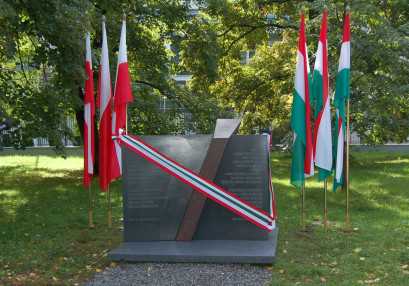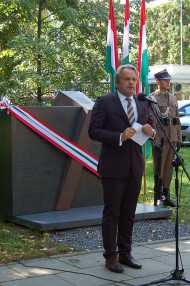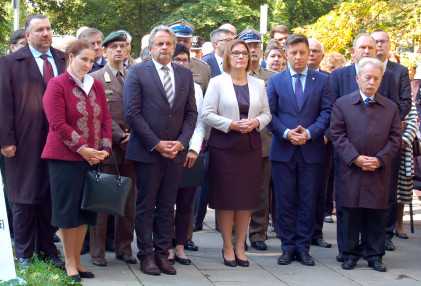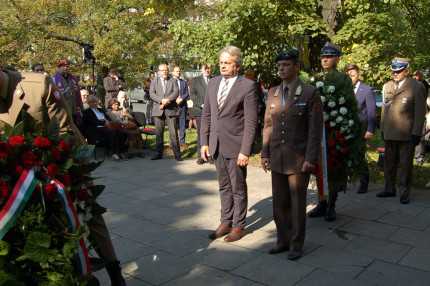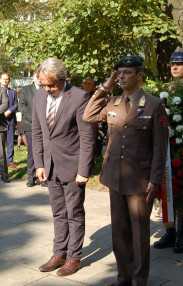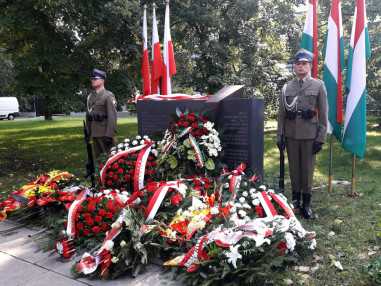Memorial to Hungarian Soldiers Assisting 1944 Warsaw Uprising Is Inaugurated in Warsaw
Szöveg: honvedelem.hu/MTI | 2017. szeptember 22. 9:00On Tuesday, 19 September, during the inauguration ceremony of a memorial to Hungarian soldiers assisting Polish insurgents in Warsaw, Deputy Minister of Defence Tamás Vargha, Parliamentary State Secretary of the Ministry of Defence pointed out that although they were fighting on the side opposing the Poles, Hungarian soldiers played a positive role during the Warsaw Uprising in 1944, in the spirit of thousand-year-old friendship.
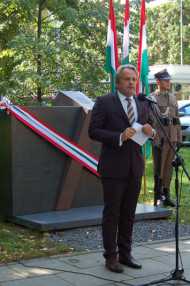
Mr. Vargha explained that the order received from Budapest forbade the one cavalry and three infantry divisions – which were led by Lt.-Gen. Béla Lengyel and stationed near Warsaw at the time –, to join the uprising, but under the same order, they supplied the insurgents with bandages, medicament, food and also ammunition and explosives, and gave assistance to wounded Poles and refugees.
Referring to German military reports, Tamás Vargha explained that the Hungarian soldiers tasked with the encirclement of Warsaw enabled the insurgents to receive fresh incoming forces during the uprising. He pointed out that helping them was not without risks, as the German patrols “ruthlessly killed all Hungarian soldiers who were caught in the act of »fraternizing« with the Poles". “Since then, our Polish friends have been taking care of some Hungarian soldiers’ graves that survived", he added.
The Parliamentary State Secretary quoted an excerpt from the memoires of Lt.-Gen. Béla Lengyel: “In the given military situation, we conducted ourselves to the extent permitted by the honor of Hungarian soldiers; and the constraints on our conduct were the oath of service, the orders we received from our superiors and our friendly neutrality towards the Polish people."
In his letter, Marek Kuchcinski underlines that the Hungarians gave assistance to the insurgents although they knew they would be strictly punished for doing so. The Marshal of the Sejm notes that several Hungarians joined the insurgents.
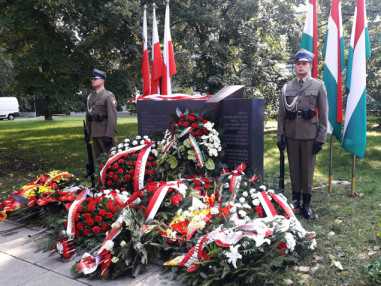
Beata Szydlo also mentions in her letter the fact that there were Hungarians fighting among the Polish insurgents. Even the Second World War was unable to sever the ties between the Polish and the Hungarian nations, the Polish Head of State points out, praising the “Hungarians’ respectable conduct" during the uprising and calling the Hungarian soldiers “brave and true men" to whom “many residents of Warsaw were grateful for saving their lives".
To mark the unveiling ceremony of the monument, a collection of studies illustrated with photos was also published, including forewords by the Hungarian and Polish ministers of defence. In his foreword, Minister of Defence Dr. István Simicskó emphasizes that the Hungarian military leaders were “completely opposed" to the German intention of deploying two Hungarian divisions – around 40,000 Hungarian troops – of Army Group Centre to crush the 1944 Warsaw Uprising. “Referring to the common past and the strong cultural relations", the Hungarians achieved that they were given orders only to isolate the city, which provided them with an excellent opportunity to help our friends who were fighting for their own freedom", Dr. István Simicskó points out.
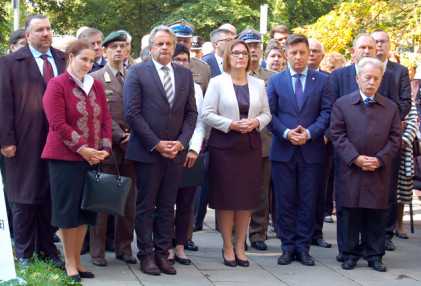
The Warsaw Uprising was sparked by the Home Army, the armed organization of the London-based Polish government-in-exile. Stationed on the far side of Vistula River, the Red Army did not advance to help the insurgents fighting against German occupation, so they had to give up the unequal struggle after two months. According to Polish historian Maria Zima, negotiations broke down between the Home Army and the Hungarian commanders on Hungarian forces joining the uprising. The reason was that the Poles could not give the Hungarians – who had been preparing for pulling out of the alliance with Nazi Germany since 1942 – any guarantees that the Western powers and the Red Army would treat Hungary as an ally. Nevertheless, the Hungarians stationed in the vicinity of Warsaw provided significant assistance for the insurgents.
Photo: Ministry of Defence
